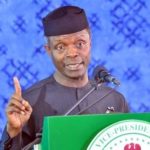The group, Society for Rule of Law in Nigeria (SRLN), said since the N4.7 billion from which Fayose allegedly got N1.3 billion was paid into the account of Sylvan McNamara Nigeria Limited owned by Obanikoro’s sons, it remained to be seen how EFCC would successfully prosecute the alleged receiver, leaving those who collected the money from the NSA.
In the statement issued on Sunday by its National Coordinator, Dr. Chima Ubeku and made available to news men in Abuja, the SRLN said that; “according to EFCC, N4.7 billion was paid into Sylvan McNamara Nigeria Limited account in Diamond Bank through the NSA office between April 4, 2014, and December 15, 2014.
ALSO READ: What I said to DSS —Oshiomhole
“Sylvan McNamara Nigeria Limited is owned by Senator Musiliu Obanikoro’s sons, Babajide and Gbolahan.”
It pointed that “assuming but not conceding that Fayose actually got the fund in question as claimed by the EFCC, how can a ‘danfo’ or ‘molue’ bus have an accident and we leave the driver who drove the bus and charge the conductor to court?
“That, exactly, is what a compromised EFCC under the influence of an equally vindictive Presidency is doing in the Fayose case”.
The group said it was on the basis of the alleged involvement of Obanikoro’s sons in the deal that they were declared wanted in 2016 by the EFCC and the question now is, what has changed?
According to the group, “Today, Babajide Obanikoro is a House of Representatives candidate of APC in Lagos while his father is in the United States of America, enjoying himself
“Can it now be concluded that the once wanted Obanikoro’s sons stayed away from Nigeria until they negotiated their way into the APC and their father sins were washed away with his rights to travel outside Nigeria restored the moment he joined the ruling party?
The group, which accused the APC government of President Muhammadu Buhari of using the EFCC to muffle the opposition, blackmail judges, and neutralise voices of dissent through selective application of the law, said the anti-graft agency’s partisanship had further been demonstrated with the Fayose case.
It therefore challenged the EFCC “to immediately do the needful by charging others now being out alongside the former Ekiti State governor in the interest of equity and fair pay”.






